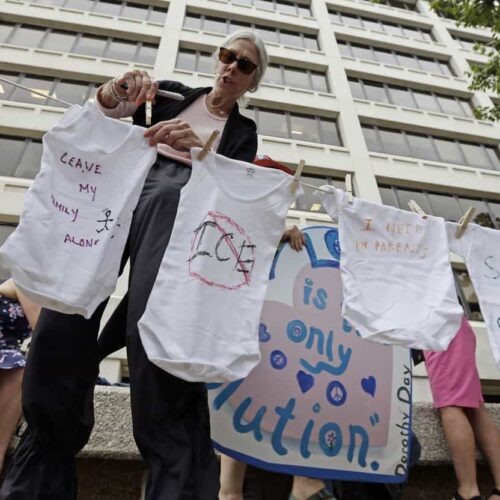Introduction
This post is part of our new community-driven reporting project, Ask Immigration Decoded. Submit your questions, and we’ll answer the most popular questions on our blog, Immigration Decoded.
In this post, we’re answering a question we received from Beverly: What happened to the nursing baby that was taken from its mother [at the U.S.-Mexico border] while feeding? With no one to care for it, did it survive?
Representatives for the Department of Homeland Security, DHS, stood firm in a conference call with reporters that they have no evidence that a nursing baby was separated from a migrant mother earlier this year, as a CNN report in June suggested might have happened. DHS officials also argued that — with rare exceptions — separating nursing children from mothers who are put into immigration detention is against policy.
DHS did not, as a policy, separate nursing children who are five years old or younger, a DHS official who asked not to be identified told the Center for Public Integrity. However, the official said, policy can allow for a nursing child to be separated if the child crossed the border with an adult who is a convicted criminal or is not related to the child. DHS is no longer separating children from parents as a rule following an order on June 20 from President Donald Trump to halt separations.
In addition to the separation claim conveyed on CNN, at least one other Central American mother — in a lawsuit — claimed that her nursing baby was also separated this spring after she was placed in detention after crossing the U.S.-Mexican border.
Reports about the separation of babies and toddlers emerged this spring after the Trump administration initiated a new policy to deter mainly Central Americans from seeking asylum in the United States. The policy called for all unapproved border crossers to be jailed and prosecuted, even for misdemeanor first-time crossings. This policy required children to be taken from their parents because children cannot be detained in adult jails.
Organizations nationally were tapped to house thousands of newly separated children. One such group was Bethany Christian Services, a Grand Rapid, Michigan, foster care and adoption agency, which took in 80 children, including infants and toddlers, as the Center for Public Integrity reported.
In her June interview with CNN, attorney Natalia Cornelio of the Texas Civil Rights Project described a talk she had with a detained Honduran mother. The woman, Cornelio said, told her that she’d been separated from her nursing child after they were taken into custody in Texas and initially held together at a detention center.
“One of the women that I interviewed today told me that she was breastfeeding her daughter when the government took her daughter from her,” Cornelio said. The woman told Cornelio she was handcuffed when she protested.
The Center recently reached Cornelio, who said she could no longer speak for the mother, who is now represented by a different lawyer. Although Cornelio declined to provide the name of the new attorney, she asked the lawyer to contact the Center. After several days, Ofelia Calderón, attorney and partner at Calderón Seguin in Falls Church, Virginia, contacted the Center.
Calderón said that she is representing a Honduran woman whose nursing child was separated from her at the border in June. But she said she didn’t receive enough information from Cornelio to confirm that the Honduran mother described on CNN are the same person. Calderón said her client and her child have been reunited and she is currently seeking asylum in the United States.
In a separate case in Washington, D.C., a 30-year-old woman from El Salvador also made a claim that she was separated from her nursing baby after both were taken into custody at the border. Her claim appeared in a lawsuit she filed on Aug. 15 against Immigration and Customs Enforcement in the U.S. District Court for the District of Columbia.
The allegations in the suit show how complex some migrant cases can be.
Leydi Duenas-Claros, a Salvadoran who had previously lived in Houston, Texas, alleged in her lawsuit that U.S. Border Patrol agents separated her from her breastfeeding 11-month-old earlier this year. She was so distressed afterward, she claimed, that she was unable to focus on a “credible fear” interview testing if she could potentially qualify for asylum. She failed her interview, which could have established her right to continue to pursue asylum in the United States — a painstaking process requiring presentation of evidence, as the Center has reported.
“Ms. D-C has suffered, and continues to suffer, extreme anguish and trauma due to the forcible separation from her infant child — a baby so young that she was still breastfeeding prior to the separation,” the lawsuit filed on behalf of Duenas-Claros argued.
The suit requested a new credible fear interview as well as a temporary restraining order against Duenas-Claros’ deportation. The government, the suit alleged, “unlawfully interfered with Duenas-Claros’ right to seek asylum and punished her for doing so by ripping her child away from her.”
Kathrine Russell, a lawyer with RAICES, a nonprofit group in Texas, provided initial legal aid to Duenas-Claros. Russell told the Center that the restraining order request is moot now because Duenas-Claros was granted and passed a second credible fear hearing.
“Leydi was released by ICE on humanitarian parole,” Russell said, and is now living in the United States with her baby and other family while she pursues asylum.
Duenas-Claros’ situation differs from most family separation cases because the baby, according to her lawsuit, was born in the United States while she was previously residing in Houston.
After the baby’s birth, Duenas-Claros returned to El Salvador with the infant and her other U.S.-born children because her family experienced a series of calamities in Houston — including Hurricane Harvey in 2017 and a fire that destroyed their home, according to Russell.
Duenas-Claros alleged in her suit that after she returned to El Salvador, her brother-in-law began abusing her and threatening to kill her so she attempted to return to the United States. She further claimed that her brother-in-law is a member of the MS-13 gang and that he had raped Duenas-Claros when she was 12. The suit claimed that Duenas-Claros’ sister was granted asylum in the United States because of her brother-in-law’s violence.
According to Russell, Border Patrol agents told Duenas-Claros that because of her baby’s U.S. citizenship it was not possible to place the baby in immigration detention with her.
Agents allegedly said that the child would be placed in Child Protective Services if a family member could not take care of her. After a family friend came forward to take the baby, Duenas-Claros was placed into a detention center on her own for two months, according to Russell.
Katie Waldman, a DHS spokeswoman, declined to comment on Duenas-Flores’ lawsuit or any “pending litigation.”



Join the conversation
Show Comments